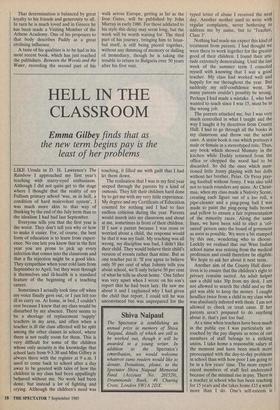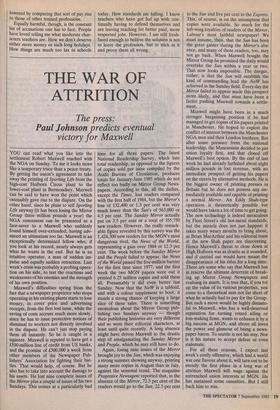HELL IN THE CLASSROOM
Emma Gilbey finds that as
the new term begins pay is the least of her problems
LIKE Ursula in D. H. Lawrence's The Rainbow I approached my first year's teaching with starry-eyed enthusiasm. Although I did not quite get to the stage where I thought that the reality of my Fulham primary school 'was, as in hell, a condition of hard malevolent system', I was much more akin to that way of thinking by the end of the July term than to the idealism I had had last September.
Everyone tells you that the first year is the worst. They don't tell you why or how to make it easier. For, of course, the best form of education is to learn from experi- ence. No one lets you know that in the first year you are prone to pick up every infection that comes into the classroom and that a flu injection might be a good idea. They sympathise when your cold lasts from September to April, but they went through it themselves and ill-health is a standard feature of the beginning of a teaching career.
Sometimes 1 actually took time off when my voice finally gave out, or I just felt too ill to carry on. At home, in bed, I couldn't rest because I knew that my class would be disturbed by my absence. There seems to be a shortage of replacement 'supply' teachers in my area, and often when a teacher is ill the class affected will be split among the other classes in school, where there is not really room for them. This is very difficult for some of the children whose only security is the knowledge that school lasts from 9-3.30 and Miss Gilbey is always there with the register at 9 a.m. I used to come back to school after a day away to be greeted with tales of how the children in my class had been appallingly behaved without me. No work had been done, but instead a lot of fighting and crying. Although the children's need was touching, it filled me with guilt that I had let them down.
The realisation that I was in my first year seeped through the parents by a kind of osmosis. They felt their children hard done by to get me with my very little experience. My degree and my Certificate of Education counted for nothing and I had to face endless criticism during the year. Parents would march into my classroom and shout at me, sometimes in front of their children. If I saw a parent because I was cross or worried about a child, the response would be that it was my fault. My teaching was all wrong, my discipline was bad, I didn't like their child. They would believe their child's version of events rather than mine. But as one teacher put it: 'If you agree to believe only 50 per cent of what Johnny tells you about school, we'll only believe 50 per cent of what he tells us about home.' One father was very upset when I wrote on his son's report that he had been lazy. He saw me about it and I explained why I had given the child that report. I could tell he was unconvinced but was unprepared for the typed letter of abuse I received the next day. Another mother used to write with regular complaints, never bothering to address me by name, but to 'Teacher, Class 3'.
Nothing had made me expect this kind of treatment from parents. I had thought we were there to work together for the greater good of their children. I found their atti- tude extremely demoralising. Until the last week of the summer term I consoled myself with knowing that I was a good teacher. My class had worked well and happily for me throughout the year. But suddenly my self-confidence went. So many parents couldn't possibly be wrong. Perhaps I had made a mistake. I, who had wanted to teach since I was 15, must be in the wrong job.
The parents attacked me, but I was very much controlled in what I taught and the way I taught it by directives from County Hall. I had to go through all the books in my classroom and throw out the sexist ones. A sexist book is one which portrays a male or female in a stereotyped role. Thus, any book which showed Mummy in the kitchen while Daddy returned from the office or chopped the wood had to be discarded. So did the ones which men- tioned little Jenny playing with her dolls without her brother, Peter. Or Peter play- ing football without Jenny. I was also told not to teach rounders any more. At Christ- mas, when my class made a Nativity Scene, creating each figure out of a loo roll, a pipe-cleaner and a ping-pong ball I was made to paint the ping-pong balls brown and yellow to ensure a fair representation of the minority races. Along the same lines, we have been told to elect a 'col- oured' person onto the board of governors as soon as possible. We were a bit stumped by this one, wondering who to choose. Luckily we realised that our West Indian school nurse was retiring from the medical profession and could therefore be eligible. We hope to ask her about it next term.
Another aim of the County Hall direc- tives is to ensure that the children's right to privacy remains sacred. An adult helper saw a child take 30p from my desk. I am not allowed to search the child and so the girl was able to keep the money. I caught headlice twice from a child in my class who was absolutely infested with them. I am not allowed to check or treat cases. If her parents aren't prepared to do anything about it, that's just too bad.
At a time when teachers have been much in the public eye I was particularly un- touched by the pay dispute as none of our members of staff belongs to a striking union. I take home a reasonable salary at the moment and have been much more preoccupied with the day-to-day problems in school than with how poor I am going to be in a few years' time. The more experi- enced members of staff feel underrated because of the minimal rise in pay. There is a teacher in school who has been teaching for 15 years and she takes home £15 a week more than I do. One's self-esteem is lowered by comparing that sort of pay rise to those of other trained professions. Equally harmful, though, is the constant list of accusations one has to face. People have loved telling me what moderate char- acters teachers are. How we don't deserve either more money or such long holidays. How things are much too lax in schools today. How standards are falling. I know teachers who have got fed up with con- tinually having to defend themselves and are leaving teaching for better paid, more respected jobs, However, I am still fresh- faced enough to believe the solution is not to leave the profession, but to stick at it and prove them all wrong.











































 Previous page
Previous page